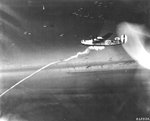Zossen
| Type | 123 Military Headquarters | |
| Historical Name of Location | Wünsdorf, Mark Brandenburg, Germany | |
| Coordinates | 52.193248000, 13.472417000 |
Contributor: C. Peter Chen
ww2dbaseStarting in 1937, the German Army began building a command center at Wünsdorf south of Berlin, Germany. The first sector completed was code named Maybach I, and it was a complex of 12 three-story buildings, connected underground with reinforced bunkers. By the time the European War began, Maybach I served as the headquarters of the Army High Command. Also found on the grounds of Maybach I was the Zeppelin communications center, alternatively known as Amt 500 or Exchange 500. Zeppelin bunkers contained sophisticated communication equipment; Zeppelin served not only the German Army but also several key government offices. In 1940, the second sector, Maybach II, was completed. The 11 buildings in the second complex, populated by the operational staff of the High Command of the Armed Forces (Oberkommando der Wehrmacht, or OKW), were completely separated from Maybach I by tall fences and barbed wires. Post-war western parlance often referred to the entire command center as Zossen, named after the nearby city. The Germans kept the location of this headquarters a closely guarded secret, but by late 1944 or early 1945 the Soviets had learned of this location, and had requested the US Army Air Forces to dispatch long range bombers to disrupt its operations. The USAAF obliged, attacking the complex several times, the largest being the raid of 15 Mar 1945 during which 25,000 incendiary bombs and 6,000 high explosive bombs were dropped; Chief of the Army General Staff Hans Krebs was wounded during this attack. In the morning of 20 Apr, OKW completed its relocation to Mürwik in northern Germany. On the following day, Soviet troops under Ivan Konev entered the evacuated grounds, capturing four German soldiers. Soviet troops found nearly all Zeppelin equipment in perfect condition, and unconfirmed stories told of hastily made signs asking the captors to take care of the highly valued machines. Between 1946 and 1947, Soviet Red Army demolished the Maybach structures as agreed upon by the Allied powers. The Zeppelin bunkers had all of their equipment removed by the Red Army before being set on fire, which caused only limited damage. During the Cold War, starting in 1960, some of the Zeppelin bunkers were used by the Soviets as a part of the Ranet army base; Ranet was closed in 1994 after the departure of Russian troops from Germany.
ww2dbaseSources:
Cornelius Ryan, The Last Battle
Third Reich in Ruins
Wikipedia
Last Major Update: Oct 2014
Zossen Interactive Map
Photographs
 |
Zossen Timeline
| 15 Mar 1945 | American bombers dropped 25,000 incendiary bombs and 6,000 high explosive bombs on the German army general staff headquarters at Zossen, Germany. |
| 20 Apr 1945 | The German OKW moved from Zossen near Berlin, Germany to Mürwik, northern Germany to escape the approaching Soviet forces. |
| 21 Apr 1945 | Soviet troops under Ivan Konev captured the German military headquarters near Zossen, south of Berlin, Germany. |
Please consider supporting us on Patreon. Even $1 per month will go a long way! Thank you. Please help us spread the word: Stay updated with WW2DB: |

Wünsdorf, Mark Brandenburg, Germany
Latitude-Longitude:
52.1932, 13.4724
- » 1,181 biographies
- » 337 events
- » 45,111 timeline entries
- » 1,246 ships
- » 350 aircraft models
- » 207 vehicle models
- » 376 weapon models
- » 123 historical documents
- » 261 facilities
- » 470 book reviews
- » 28,473 photos
- » 365 maps
George Patton, 31 May 1944
Please consider supporting us on Patreon. Even $1 a month will go a long way. Thank you!
Or, please support us by purchasing some WW2DB merchandise at TeeSpring, Thank you!